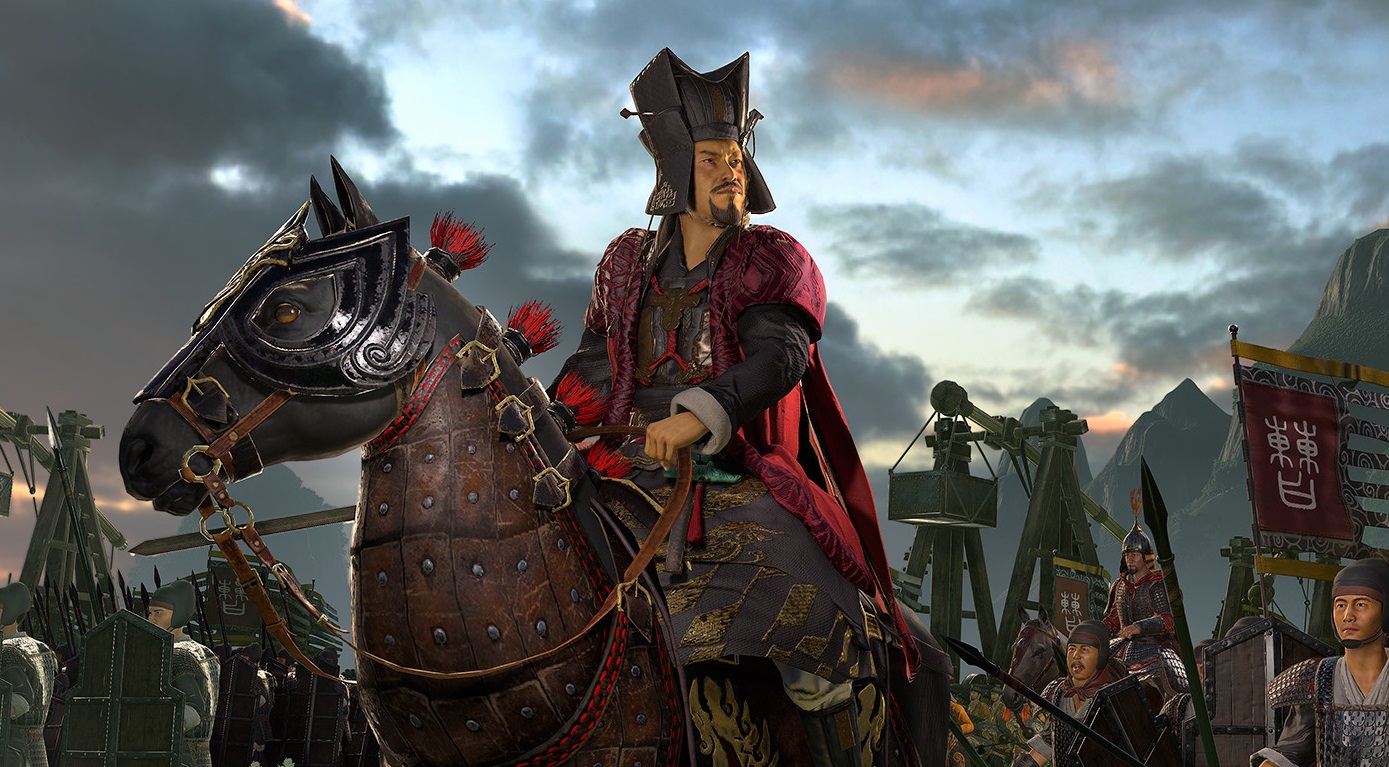Our Verdict
Not the best Total War game but not the worst by a long shot.
PC Gamer's got your back
What is it? Turn-based kingdom management and real-time warfare in ancient China.
Expect to pay £45/$60
Developer Creative Assembly
Publisher Sega
Reviewed on Windows 10, Intel Core i7, 16GB RAM, Nvidia GTX 1060
Multiplayer Local and online, battle or campaign
Link Official site
Two of my generals dismount in the middle of a field to duel with their opposite numbers. The rest of the battle continues in the distance, but I've zoomed in to watch the flashy moves as the generals kick and stab each other instead. Occasionally a flurry of arrows or a riderless horse will pass in the background, but I'm intently focused on something that looks more like a game of Tekken.
Total War: Three Kingdoms embraces the story it's inspired by, Romance of the Three Kingdoms by Luo Guanzhong, rather than strict historical accuracy. Soldiers can run around the battlefield seemingly forever without getting tired. Their leaders are larger-than-life figures with complicated backstories and rivalries, who carry legendary spears and are able to defeat entire units single-handed. Characters like Cao Cao are cast as devious opera villain masterminds able to manipulate wars into existence at the drop of a hat, when the history books suggest he was a decent ruler and also quite a good poet.
There's an option to turn some of these things off at the start of a campaign by engaging Records Mode, if you want stamina to play a more important role in unit repositioning or to get rid of the duels and get generals' bodyguards to do most of their fighting instead. The alternative, Romance Mode, feels like an honest embrace of what Total War has really been all along, though. It's a version of history that's closer to an epic movie, where the broad sweep is familiar but subtleties are ignored whenever they would be inconvenient to the action.
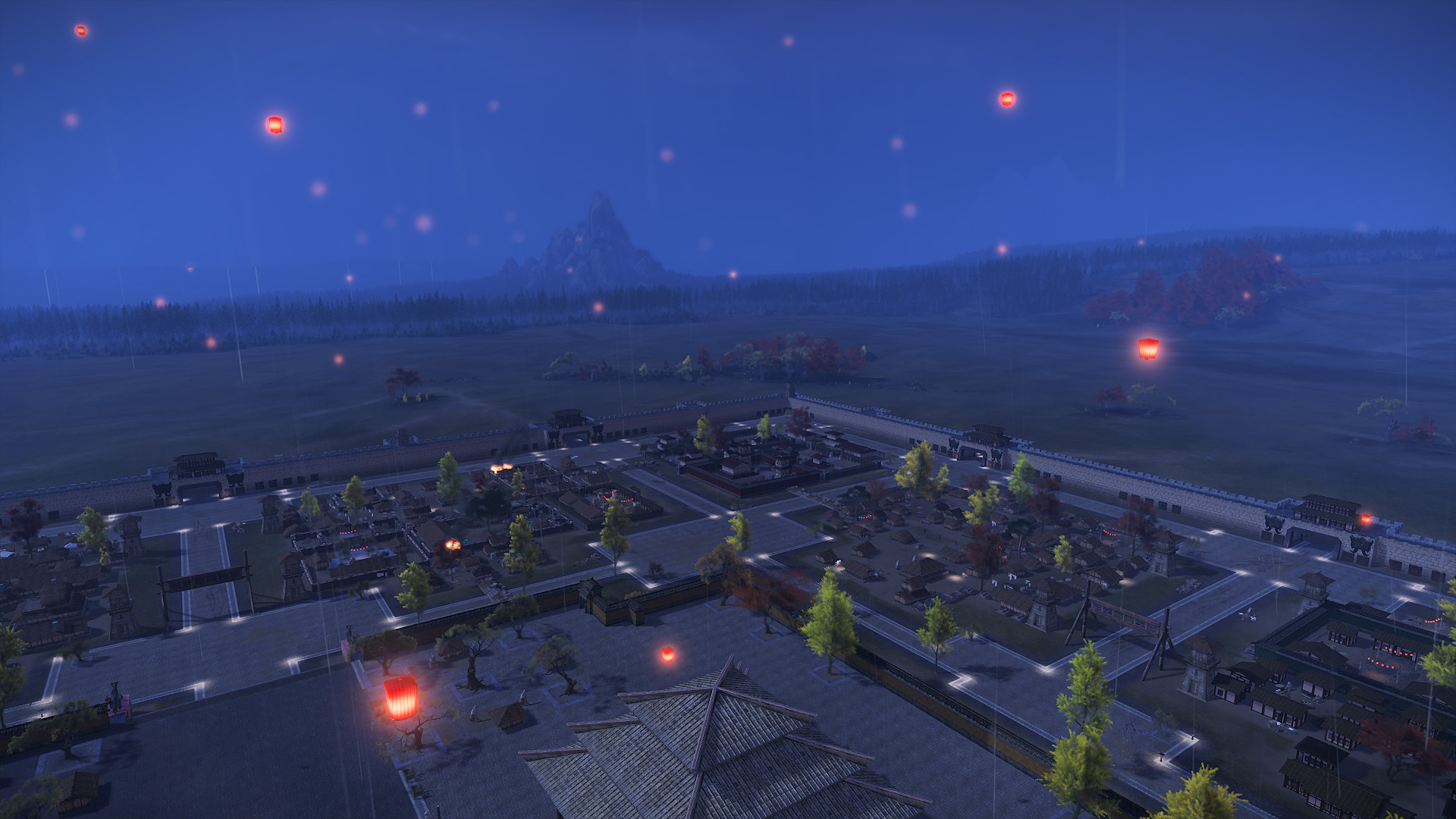
That said, it's still the kind of epic where you'll also have to increase three different types of income by small percentages. The systems that were simplified for the Warhammer games or the trimmed-down Thrones of Britannia have returned to the party and brought some new friends. Espionage has its own menu full of options so that embedded spies can mess with trade or sabotage cities. Characters have a satisfaction score that will drop if they're not promoted regularly enough. Court positions that are unlocked as you level up have to be handed out carefully to prevent dissatisfied generals from starting a civil war. (You can also give them a nice water clock to boost their satisfaction.)
Diplomacy is one of the most substantial and welcome areas to be changed. Where before there was so much guesswork involved that dealing with rival nations felt like passing notes in class and then waiting for an answer ("Do you want to form a defensive alliance with me, y/n"), in Three Kingdoms it's completely transparent. Whenever I ask a neighbour for something there's a button to automatically figure out what it would take to make that deal work. It just straight-up tells you how much money will guarantee this trade of territory or food or even marriage, rather than making you stab in the dark then try again when it fails.
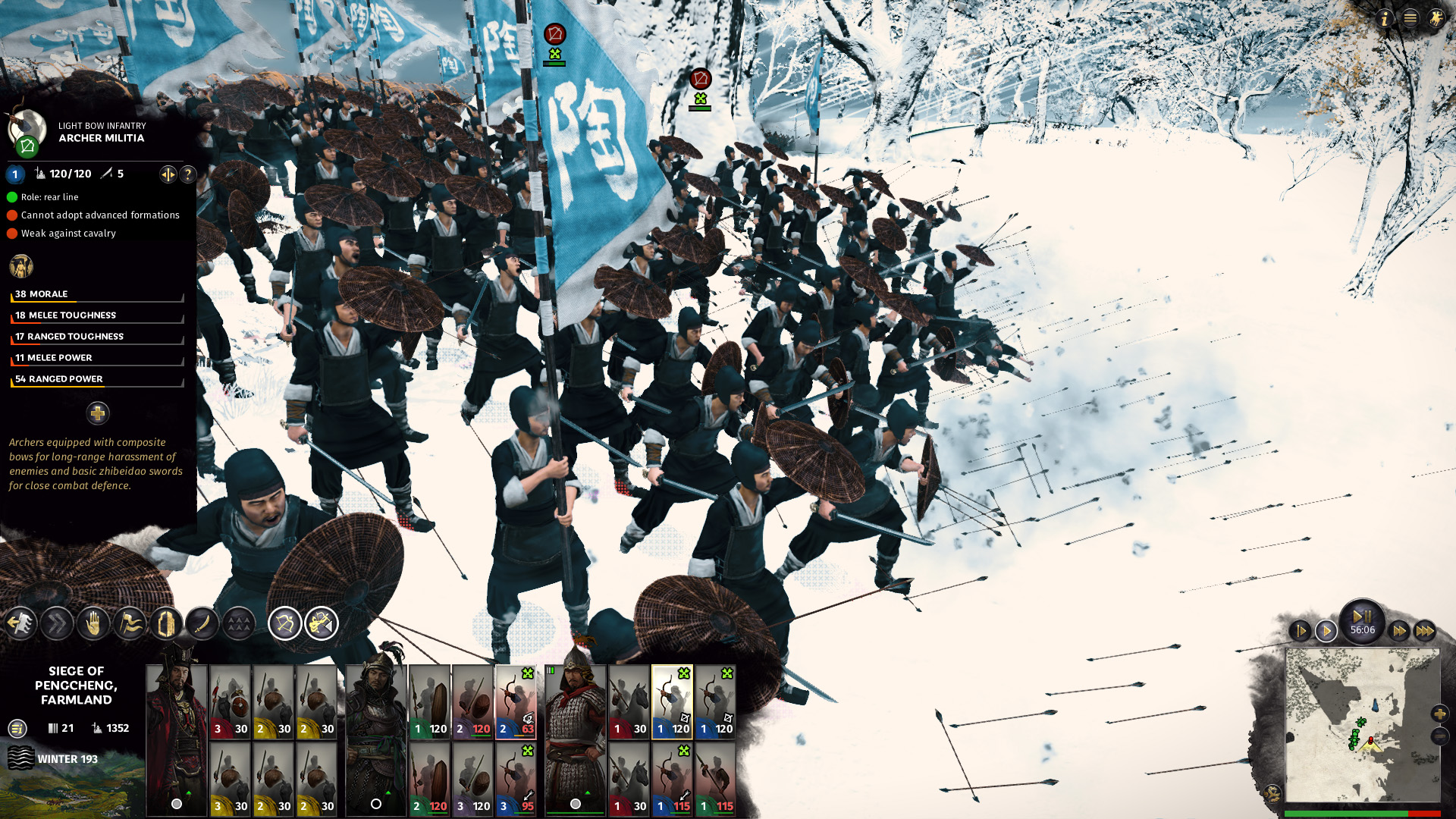
There's a finer grain to the diplomatic options as well. Between non-aggression pacts and alliances there are coalitions, unions that act as a step along the path to confederation without being guarantees of friendship forever. They allow for more than two members as well, so my Confederation to Defeat the Barbarians has new faction leaders lining up to join it on the regular.
Everyone in the coalition gets a vote on who is allowed in, so frequently someone like the bandit queen will rock up to the table and be voted against by a majority even before I get to make a decision, leaving just a button that lets me acknowledge her application while sadly declining it on this occasion. It feels like being part of an exclusive high school clique everyone wants in on but, my god, did you see what Zheng Jiang wore to Brad's party? Request denied.
Diplomacy has been a weak point for Total War even as other systems have improved, so these are welcome changes. So is the quick deal button, which lets you immediately see who is open to trade or vassalhood or whatever rather than having to scroll down a list.
Vassals are an important part of Three Kingdoms, with factions much more eager to suggest handing some of their income over to you in perpetuity, though they may demand a degree of autonomy at the same time. Your enemies can even submit themselves to vassalage under your allies as a last-ditch attempt to end wars, forcing you to either give up on your conquest or upset the ally in question.
World of warlords
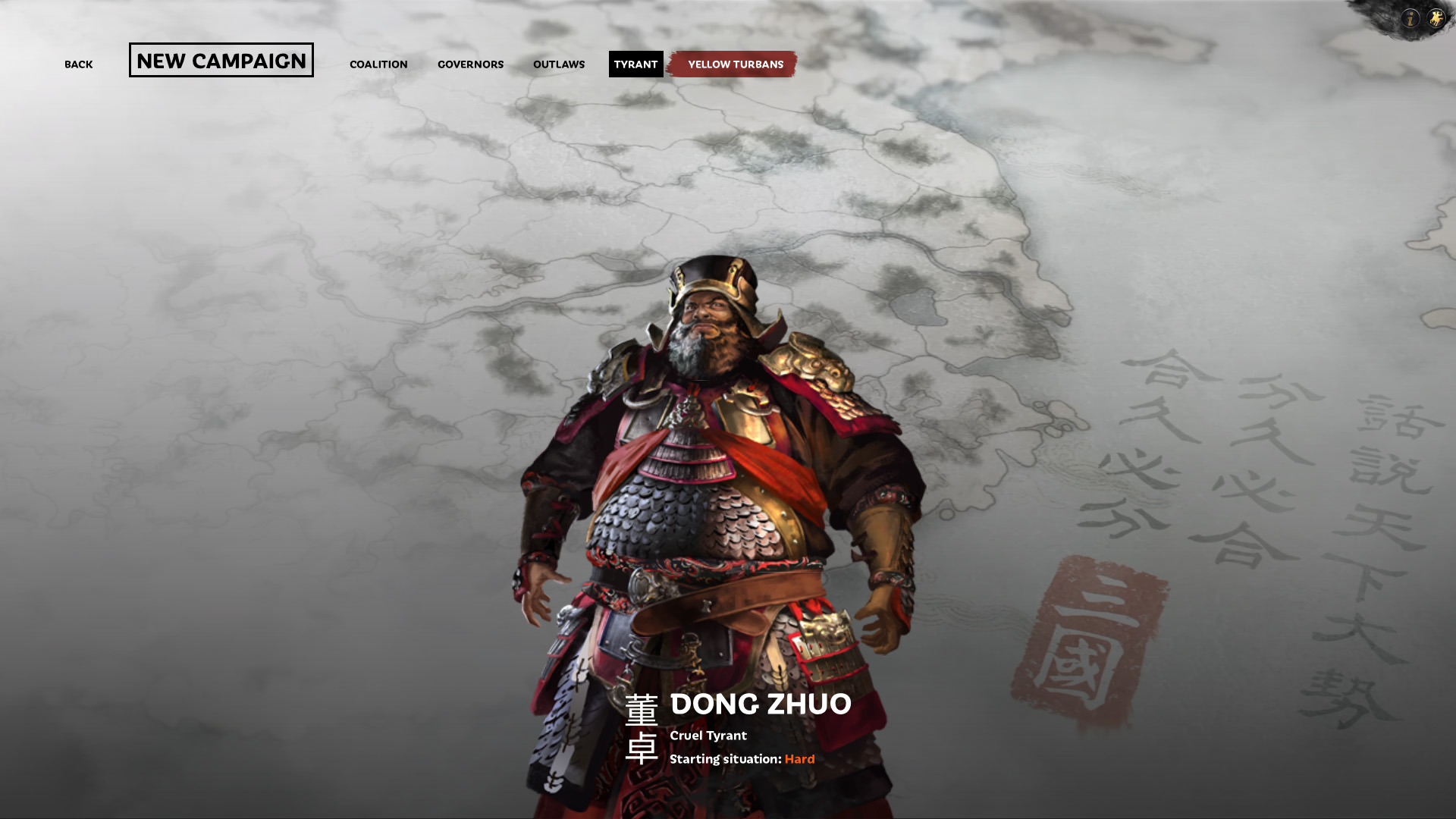
Rather than choosing a faction at the start of a campaign you choose an individual leader. Some of them are warlords with varying degrees of legitimacy to their attempt to take charge of China, some of them are straight-up bandits, and one of them is Dong Zhuo, a tyrant who begins the campaign with the current child-Emperor as a hostage.
These very different characters can make for very different starts—Cao Cao, the suggested beginner's choice, feels more like trad Total War in that you have a decent settlement, an army, and a neighbour to defeat so you can complete your first province (here called a commandery). Meanwhile, Liu Bei has an army full of legendary generals but no home and has to defeat an army of Yellow Turban rebels before settling anywhere.
Each character has a different mechanic that defines them too. Gongsun Zan's military government adds a unique court position for military inspectors, while Sun Jian's fluctuating heroism score affects the price of troops and the satisfaction of characters. Cao Cao earns a handful of credibility points every turn and can spend them to influence the feelings of other factions, or even blow 75 of them at once initiating a proxy war between others while seeming to have clean hands.
That extra degree of manipulation makes the diplomacy even more fun. It's like the way the high elves worked in Total War: Warhammer 2 but with even more ability to be a devious jerk. Being able to get right into the guts of diplomacy like this makes the campaign side of Three Kingdoms more impactful, and after a certain point every turn begins with a parade of messages about who has turned on who. They pop up alongside images of the leaders pulling intense faces that make them hard to take seriously, it's all a bit "Friendship ended with KINGDOM OF WU, now KINGDOM OF WEI is my best friend."
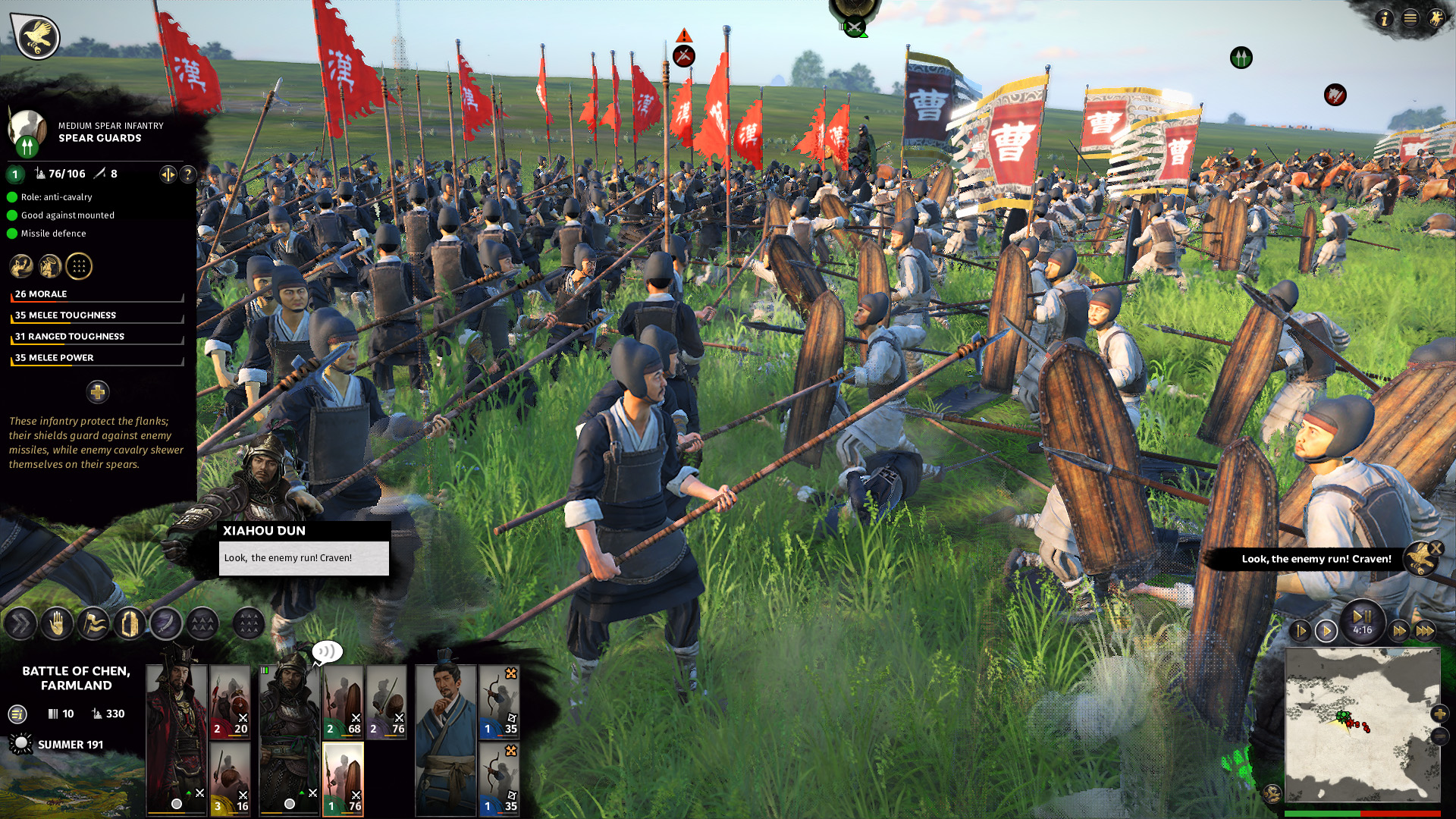
Other parts of the turn-based campaign side of Three Kingdoms are less jolly. Population is important—a high rate of growth, facilitated by constructing the right buildings, can increase your armies' replenishment rate but also cause overpopulation, the main culprit of public disorder. Having too many people also puts a strain on the food supply.
Meanwhile, you want to keep constructing buildings that earn money and increase prestige (which is how you unlock higher ranks, fill out your court, and eventually declare yourself one of China's three kings). I can't say working my way through upgrades of various buildings has ever been my favorite part of Total War and when you control something on the north side of 20 settlements managing all this construction can be a real bore.
On the upside each member of your court can be given an assignment, attaching them to a settlement and giving it some kind of bonus. You don't need to march them around the map to do this—like espionage it's just a menu. It feels like a way of keeping some of the things agents and heroes did in former games but abstracted enough that they aren't an annoyance, and it also keeps them off map so it's free for actual armies to do their thing.
I look forward to seeing how things like the diplomacy system and maybe duels carry on into Warhammer 3 and whatever else comes next
According to one point of view, all this stuff on the campaign map and its multitude of attached menus—I haven't even mentioned the reforms, a tech tree mapped onto a picture of an actual tree where each improvement lights up a blossom of petals—is just scene-setting for the battles. And it's true that it gives them context that can make the next siege feel different to the last one no matter how similar they actually are in play.
I enjoy the campaign for its own sake though, even if it can occasionally be too mathematical for its own good. For an example of that look no further than the way it takes an important theme of Romance of the Three Kingdoms like corruption, personified by traitorous eunuchs who nepotistically manipulate their friends into positions they don't deserve while the country falls apart. In Total War: Three Kingdoms corruption is a percentage modifier that impacts your income. It's so prosaic it's almost funny.
The pointy end
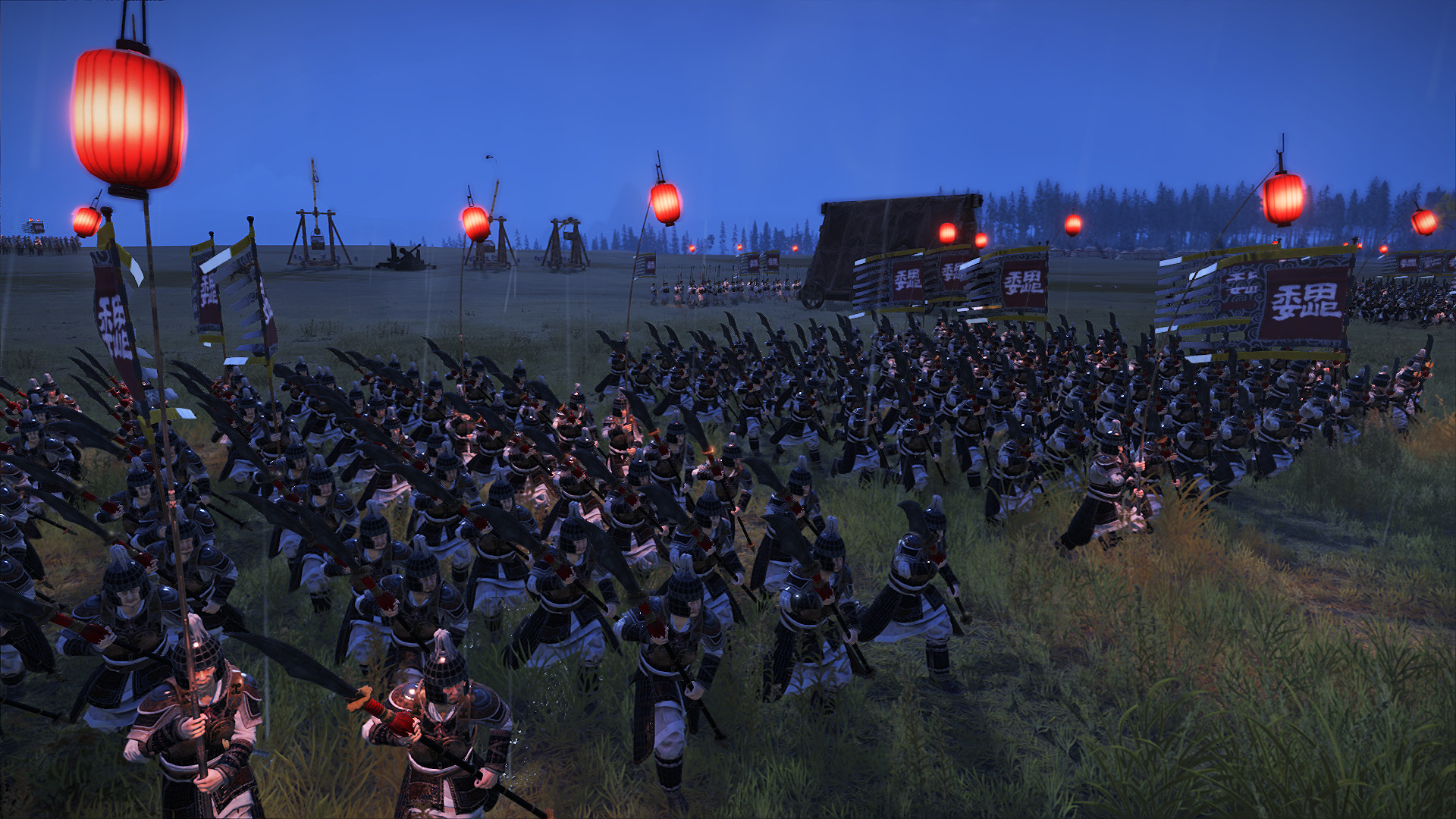
It's been well-known for a while now that the only way to get loading times down on the recent Total War games is to install them on an SSD. Trying to play Total War: Warhammer 2 on an old HDD could mean loading times of over 10 minutes. Three Kingdoms, running off an SSD, takes only 1.50 to load a campaign and just over two minutes to load into battles. Get an SSD.
The real-time battles are more immediately exciting than the numbers game. Units with crossbows chunter out steady volley after volley of bolts, horseriders form up into wedges at the last minute and charge, infantry lock down their shields and absorb damage. Formations are back and there are plenty of them, though it's not always easy to get access to them. There are multiple classes of general to choose from and strategists, while weaker, are necessary because they learn formations as they level up. Some followers have access to them as well, so assigning a herdsman to the general with a cavalry retinue means they'll know the wedge formation.
An army can have three generals, each with a retinue of up to six units. This lends itself to balanced armies with one general for cavalry, one for infantry, and one for archers and catapults. Which is not to say you can't make unbalanced or hyper-specialised armies, it just feels wrong. Generals have personalities that suit their roles, expressed as they banter with each other during battles. They even gain traits and develop rivalries and friendships with each other the longer they spend together. You want to build them and arm them like party members in an RPG.
Units don't have as much personality as I'd like. Now that the Warhammer games exist it's always going to be hard to compete on that front, because no matter how different two kinds of rider are they're never going to be as immediately distinct as orcs or vampires. On the personality front, it doesn't help that units will sometimes stand in place and let you shoot them for a bit too long before doing something about it, or ignore a target you left open and charge the wrong one. Of course the AI has never been the shining high point of Total War so if you're along for the ride you're used to this by now.
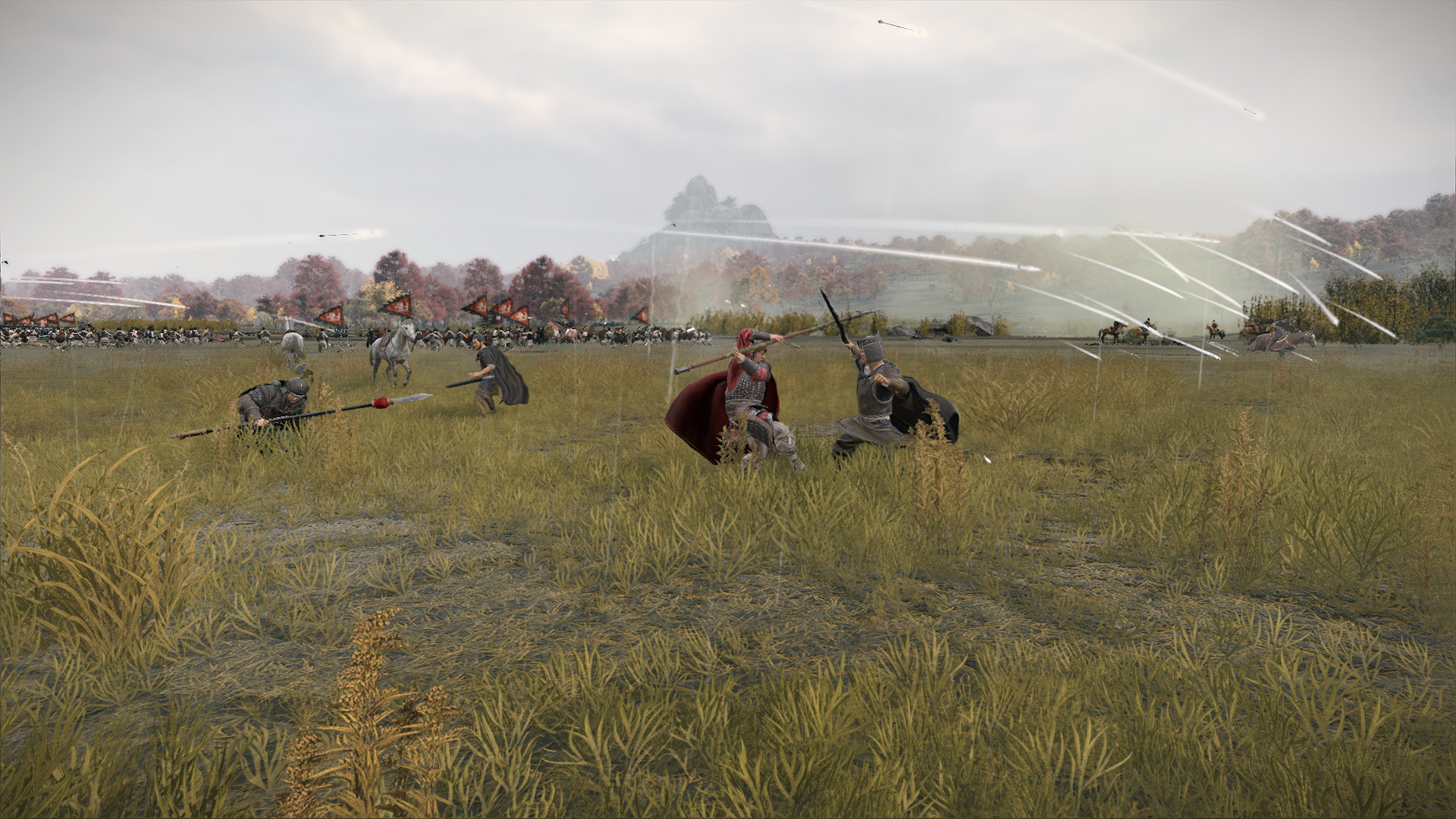
While generals have attack animations right out of kung-fu movies, when ordinary soldiers collide there's a lot of milling around and swiping at the air going on. Of course there's none of the over-the-top madness of the Warhammer games, because there aren't hydras breathing fire or giants swinging treetrunks around, but there's also none of the individual clashes that made Shogun 2 so much fun to watch. It's fine from a distance, but unrewarding if you like to hit the slow-motion button, press K to make the HUD fall away, and watch things up close.
Night battles do look gorgeous, though. Troops carry red lanterns on poles and cities under siege fill the sky with floating paper lanterns like low-hanging stars. Battles during winter take place on maps covered in high-contrast snow, while at other times of year farmers might be working in paddy fields as you ride past. Port cities have cranes on the docks and boats in the harbor.
That said, there are no naval battles. The Creative Assembly has given up on them completely it seems, and while armies board ships when they head onto the water, encounters at sea are resolved automatically. Given how important rivers like the Yangtze are to China strategically it's a missed opportunity. Imagine if John Woo's movie Red Cliff, after hours of build-up, ended with someone clicking autoresolve.
Anticlimax is a problem with Three Kingdoms more generally. At a certain point in the campaign the three leading warlords are declared kings and have to fight it out to determine who will be sole emperor. When I marched a decent army into my first opponent's territory they abdicated and surrendered to me, so I switched my attention to the final remaining enemy, the Kingdom of Wu. After many turns spent building armies as strong as my economy allowed, I sent one full stack the long way around via the water to attack his capital from behind while the rest of my armies marched on our shared border capturing villages and small cities.
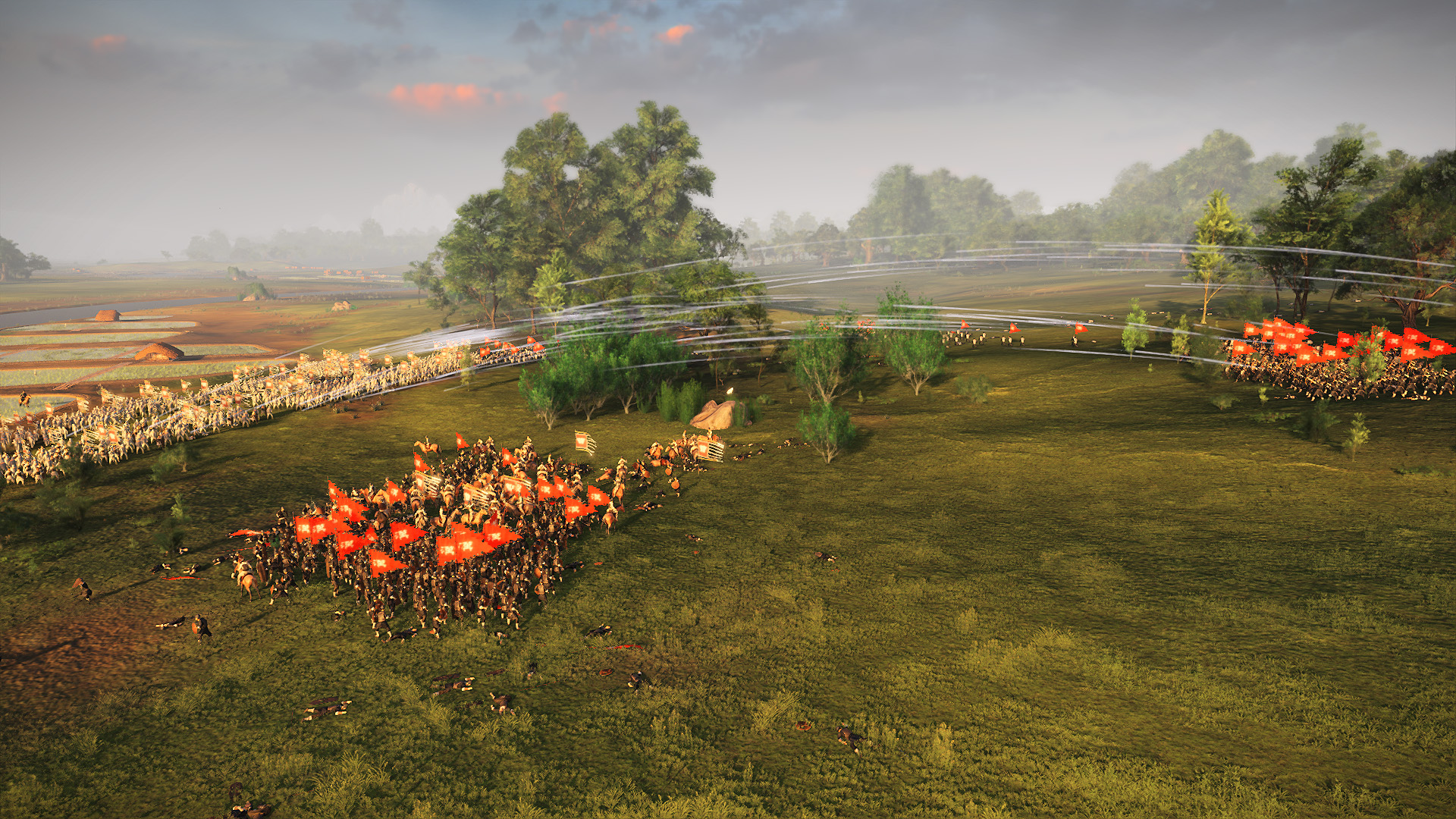
After a few seasons of this I finally drew his full force out. Wu's best armies stayed close together, but one set itself up in ambush nearby. I discovered it thanks to one of my generals having keen eyes, attacked with superior numbers, and defeated it handily. The rest of his forces were still formidable though, and mine slightly weakened by wiping out the failed ambush. We faced off for the climactic finale. And then on his turn a diplomacy pop-up informed me he wanted to surrender and abdicate.
A relatively bloodless victory is nice and all, and it's a credit to the AI that it knows when it's about to be beaten, but it was a hell of a downer way to end a campaign. I could have said no to the offer and carried on the war but it would have felt like bullying at that point. As I said, the campaign lends context to the battles, and sometimes that context can take away from them as well.
Plenty of these criticisms—an underwhelming endgame, or clunky battle animations, or AI oddness—have been true of other Total War games. Three Kingdoms is no worse than many of them and better than quite a few. I look forward to seeing how things like the diplomacy system and maybe duels carry on into Warhammer 3 and whatever else comes next, it's just hard to look past Three Kingdoms' role as another iteration on a familiar formula.
That's the problem with there being so many Total War games at the moment. A new one comes out while the last two are still fresh in our memories. Three Kingdoms is a very good strategy game in which to experience 2nd century China, and I've spent dozens of enjoyable hours with it. When you zoom in close on the right details, whether it's two generals duelling or an enemy turning the vassal system against you, it's grand.
Not the best Total War game but not the worst by a long shot.

Jody's first computer was a Commodore 64, so he remembers having to use a code wheel to play Pool of Radiance. A former music journalist who interviewed everyone from Giorgio Moroder to Trent Reznor, Jody also co-hosted Australia's first radio show about videogames, Zed Games. He's written for Rock Paper Shotgun, The Big Issue, GamesRadar, Zam, Glixel, Five Out of Ten Magazine, and Playboy.com, whose cheques with the bunny logo made for fun conversations at the bank. Jody's first article for PC Gamer was about the audio of Alien Isolation, published in 2015, and since then he's written about why Silent Hill belongs on PC, why Recettear: An Item Shop's Tale is the best fantasy shopkeeper tycoon game, and how weird Lost Ark can get. Jody edited PC Gamer Indie from 2017 to 2018, and he eventually lived up to his promise to play every Warhammer videogame.
